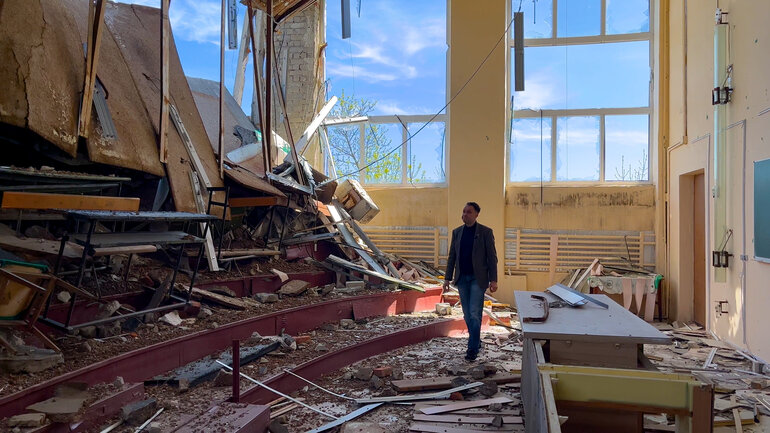Mental Health and Migration: Wartime Challenges for Ukrainian Academics
Studies show that burnout and anxiety are widespread among Ukrainian academics as a result of the war. Many are even considering a change of career. Yet maintaining a strong education and research sector is essential for the future of the country. How can this be achieved?

Imagine delivering a lecture while air raid sirens wail or grading papers by candlelight during a blackout. This is the stark reality for many Ukrainian academics amid the turmoil of war. Academic staff at Ukraine’s universities are at a crossroads of personal and professional upheaval as they navigate power outages and unstable internet access. Yet, despite these challenges, they persist in teaching, mentoring, and conducting research, demonstrating remarkable resilience in the face of wartime adversity.
Migration has added another layer of complexity to their lives and work. According to a UNESCO report, 12 per cent of Ukrainian academic staff have emigrated or been internally displaced, and approximately 30 per cent now work remotely. While remote work provides a means for staff to maintain continuity, it often amplifies feelings of isolation and disconnection, placing further strain on their mental resilience. These intersecting pressures of war and migration underscore a critical but often overlooked aspect of wartime resilience: the mental health of academic staff as a cornerstone for preserving human capital in the higher-education and science sectors.
The psychological toll of war on Ukraine’s academics
Recent nationwide studies during Ukraine’s full-scale invasion have revealed a sobering reality: the ongoing war has profoundly affected the mental health of academic staff. Forced migration, unstable working conditions, and relentless pressure to maintain academic standards amid the war have brought alarming levels of burn-out and anxiety.
Burn-out, a condition defined by emotional exhaustion, depersonalisation, and a diminished sense of professional achievement, has become increasingly pervasive. Prolonged stressors of wartime conditions have intensified its impact, particularly on displaced academics. A national study found that emotional exhaustion – a key dimension of burn-out – affected 64 per cent of external migrants, 55 per cent of internal migrants, and 45 per cent of non-migrants. The stark differences underline the compounded challenges faced by displaced individuals. Depersonalisation, characterised by feelings of detachment and cynicism, has also risen sharply, particularly among those uprooted by the war.
Anxiety is another pressing issue, with 44.3 per cent of academic staff experiencing moderately severe to severe levels – figures that far exceed those typically seen in peacetime. Interestingly, the war has shifted traditional gender patterns in the prevalence of anxiety. While women usually report higher levels of anxiety in peacetime, male academics have exhibited more severe anxiety during the war. This reversal is attributed to societal pressures, including the expectation of conscription and the psychological burden of being unable to contribute directly to defence efforts.
Migration has exacerbated these mental health challenges. Both internal and external migrants report higher rates of severe anxiety – 26.4 per cent and 25.8 per cent, respectively, compared with 15.5 per cent of those who have remained in their original place of residence. Migration introduces layers of uncertainty, professional disruption, and social isolation, amplifying stress and undermining resilience.
An erosion of universities’ intellectual potential
The compounded challenges of migration and mental health crises among Ukrainian academic staff during the war pose significant threats to the nation’s human capital in the higher-education and science sectors. As academic staff navigate burn-out, anxiety, and professional instability, the country risks losing a substantial portion of its intellectual capacity, a critical resource for recovery and growth.
One of the most immediate risks is brain drain. The forced migration – both internal and external – of academic staff intensifies the likelihood of highly skilled professionals permanently leaving academia or the country altogether. A forthcoming study reveals that 14.4 per cent of external migrants frequently contemplated leaving the academic field, signalling the potential loss of their expertise.
Institutional instability further compounds these challenges. With nearly 46 per cent of academic staff considering career changes, universities face difficulties maintaining continuity, implementing necessary reforms, and fostering a resilient academic environment. This instability disrupts the education process and weakens institutions’ ability to respond effectively to wartime challenges.
Migration, coupled with a lack of resources and institutional support, disrupts academics’ ability to conduct meaningful research. This stagnation in intellectual output hinders the generation of innovative solutions needed to address Ukraine’s socio-economic challenges during and after the war.
Finally, the mental health crisis among academic staff underscores the fragility of Ukraine’s human capital, with broad implications for national resilience when it comes to cultivating future leaders and innovators.
Preserving Ukraine’s academic future through mental health support
Without targeted support and adequate resources, the mental health crisis among Ukrainian academic staff risks profound and lasting damage to both individuals and institutions. To mitigate these challenges, universities must implement immediate and sustained interventions, including accessible mental health support tailored to the unique needs of academics who have migrated and work remotely. Mental health support programmes for both internal and external migrants can help restore a sense of stability and belonging. At the same time, flexible policies that accommodate self-directed recovery and adaptive work conditions can empower educators to navigate their extraordinary circumstances.
Addressing mental health needs is not only an act of support but also an investment in Ukraine’s future. By prioritising the mental health and well-being of those responsible for educating future generations and driving innovation, Ukraine can safeguard its higher-education system as a cornerstone of national renewal.
Dr Natalia Tsybuliak is a fellow at the Ukraine Research Network@ZOiS, funded by the German Federal Ministry of Education and Research, where she works on the project Mental Health of Ukrainian Academic Staff During Wartime.